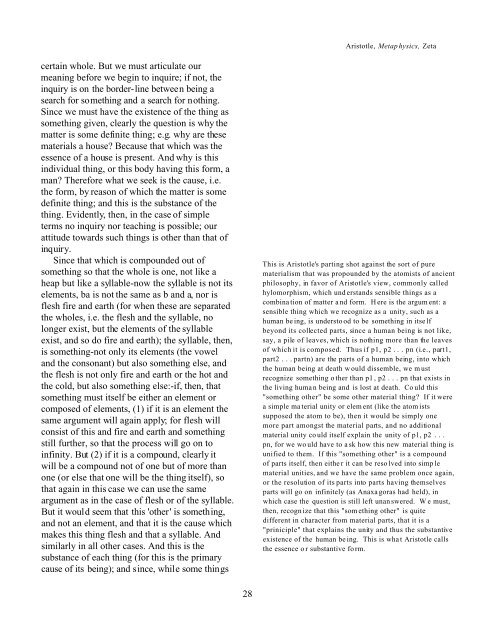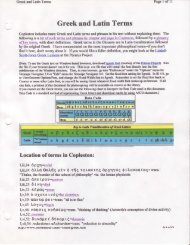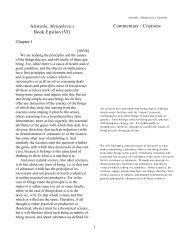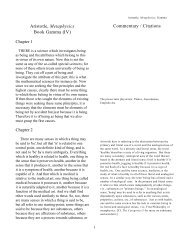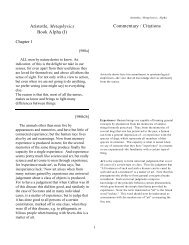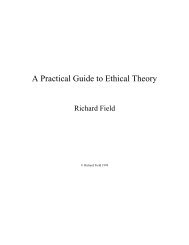Aristotle, Metaphysics Book Zeta (VII) Commentary ... - CATpages
Aristotle, Metaphysics Book Zeta (VII) Commentary ... - CATpages
Aristotle, Metaphysics Book Zeta (VII) Commentary ... - CATpages
You also want an ePaper? Increase the reach of your titles
YUMPU automatically turns print PDFs into web optimized ePapers that Google loves.
<strong>Aristotle</strong>, <strong>Metaphysics</strong>, <strong>Zeta</strong><br />
certain whole. But we must articulate our<br />
meaning before we begin to inquire; if not, the<br />
inquiry is on the border-line between being a<br />
search for something and a search for nothing.<br />
Since we must have the existence of the thing as<br />
something given, clearly the question is why the<br />
matter is some definite thing; e.g. why are these<br />
materials a house? Because that which was the<br />
essence of a house is present. And why is this<br />
individual thing, or this body having this form, a<br />
man? Therefore what we seek is the cause, i.e.<br />
the form, by reason of which the matter is some<br />
definite thing; and this is the substance of the<br />
thing. Evidently, then, in the case of simple<br />
terms no inquiry nor teaching is possible; our<br />
attitude towards such things is other than that of<br />
inquiry.<br />
Since that which is compounded out of<br />
something so that the whole is one, not like a<br />
heap but like a syllable-now the syllable is not its<br />
elements, ba is not the same as b and a, nor is<br />
flesh fire and earth (for when these are separated<br />
the wholes, i.e. the flesh and the syllable, no<br />
longer exist, but the elements of the syllable<br />
exist, and so do fire and earth); the syllable, then,<br />
is something-not only its elements (the vowel<br />
and the consonant) but also something else, and<br />
the flesh is not only fire and earth or the hot and<br />
the cold, but also something else:-if, then, that<br />
something must itself be either an element or<br />
composed of elements, (1) if it is an element the<br />
same argument will again apply; for flesh will<br />
consist of this and fire and earth and something<br />
still further, so that the process will go on to<br />
infinity. But (2) if it is a compound, clearly it<br />
will be a compound not of one but of more than<br />
one (or else that one will be the thing itself), so<br />
that again in this case we can use the same<br />
argument as in the case of flesh or of the syllable.<br />
But it would seem that this 'other' is something,<br />
and not an element, and that it is the cause which<br />
makes this thing flesh and that a syllable. And<br />
similarly in all other cases. And this is the<br />
substance of each thing (for this is the primary<br />
cause of its being); and since, while some things<br />
This is <strong>Aristotle</strong>'s parting shot against the sort of pure<br />
materialism that was propounded by the atomists of ancient<br />
philosophy, in favor of <strong>Aristotle</strong>'s view, commonly called<br />
hylomorphism, which und erstands sensible things as a<br />
combination of matter and form. H ere is the argum ent: a<br />
sensible thing which we recognize as a unity, such as a<br />
human being, is understood to be something in itself<br />
beyond its collected parts, since a human being is not like,<br />
say, a pile of leaves, which is nothing more than the leaves<br />
of which it is composed. Thus if p1, p2 . . . pn (i.e., part1,<br />
part2 . . . partn) are the parts of a human being, into which<br />
the human being at death would dissemble, we must<br />
recognize something o ther than p1, p2 . . . pn that exists in<br />
the living human being and is lost at death. Co uld this<br />
"something other" be some other material thing? If it were<br />
a simple material unity or element (like the atom ists<br />
supposed the atom to be), then it would be simply one<br />
more part amongst the material parts, and no additional<br />
material unity could itself explain the unity of p1, p2 . . .<br />
pn, for we wo uld have to ask how this new material thing is<br />
unified to them. If this "something other" is a compound<br />
of parts itself, then eithe r it can be reso lved into simp le<br />
material unities, and we have the same problem once again,<br />
or the resolution of its parts into parts having themselves<br />
parts will go on infinitely (as Anaxagoras had held), in<br />
which case the question is still left unanswered. W e must,<br />
then, recognize that this "som ething other" is quite<br />
different in character from material parts, that it is a<br />
"priniciple" that explains the unity and thus the substantive<br />
existence of the human being. This is what <strong>Aristotle</strong> calls<br />
the essence o r substantive form.<br />
28


